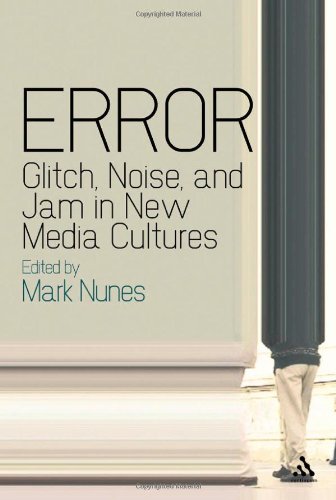Mark Nunes (ed.): Error: Glitch, Noise, and Jam in New Media Cultures (2010)
Filed under book | Tags: · botnet, error, facebook, glitch, hacktivism, machinima, media culture, new media, noise, tactical media, wikipedia, youtube

Divided into three sections, Error brings together established critics and emerging voices to offer a significant contribution to the field of new media studies. In the first section, “Hack,” contributors explore the ways in which errors, glitches, and failure provide opportunities for critical and aesthetic intervention within new media practices. In the second section, “Game,” they examine how errors allow for intentional and accidental co-opting of rules and protocols toward unintended ends. The final section, “Jam,” considers the role of error as both an inherent “counterstrategy” and a mode of tactical resistance within a network society. By offering a timely and novel exploration into the ways in which error and noise “slip through” in systems dominated by principles of efficiency and control, this collection provides a unique take on the ways in which information theory and new media technologies inform cultural practice.
Publisher Continuum International Publishing Group, 2010
ISBN 144112120X, 9781441121202
288 pages
Download (link removed by request from publisher)
Marc Stumpel: The Politics of Social Media. Facebook: Control and Resistance (2010)
Filed under thesis | Tags: · facebook, floss, open source, protocol, resistance, software, tactical media, web, web 2.0
This thesis examines the governance of contemporary social media and the potential of resistance. In particular, it sheds light on several cases in which Facebook has met with resistance in its attempt to exercise control. This social networking site has raised concerns over privacy, the constraints of its software, and the exploitation of user-generated content.
By critically analyzing the confrontations over these issues, this thesis aims to provide a framework for thinking about an emerging political field. This thesis argues that discursive processes and (counter)protocological implementations should be regarded as essential political factors in governing the user activities and conditions on large social networking sites.
A discourse analysis unveils how Facebook enacts a recurrent pattern of discursive framing and agenda-setting to support the immediate changes it makes to the platform. It shows how contestation leads to the reconfiguration and retraction of certain software implementations. Furthermore, a software study analyzes how the users are affected by Facebook’s reconfiguration of protocological assemblages. Several tactical media projects are examined in order to demonstrate the mutability of platform’s software.
Keywords: Facebook, Network-making power, Counterpower, Framing, Protocol, Tactical Media, Exploitation, Open-source, Agonistic Pluralism, Neodemocracy
Master thesis
Media Studies (New Media), University of Amsterdam
Supervisor: Dr Thomas Poell
Second reader: Dr Geert Lovink
Date: August 16, 2010
82 pages
Adam Arvidsson, Elanor Colleoni: Value in Informational Capitalism and on the Internet. A Reply to Christian Fuchs (draft, 2011)
Filed under paper | Tags: · affect, cognitive capitalism, facebook, informational capitalism, marxism, post-marxism, theory of value, web 2.0
This article critically engages with recent applications of the Marxist ‘labor theory of value’ to online prosumer practices, and offers an alternative framework to theorize value creation in such practices. We argue that the labor theory of value is difficult to apply to online prosumer practices for two reasons. First because value creation in such practices is poorly related to time. Second because the realization of the value accumulated by social media companies generally occurs on financial markets, rather than in direct commodity exchange. In alternative we offer an understanding of value creation as based primarily on the capacity to initiate and sustain webs of affective relations, and value realization as linked to a reputation based financial economy. We argue that this model describes the process of value creation and appropriation in the context of online prosumer platforms better than an approach based on the marxian labor theory of value. We also suggest that our approach can be cast new light on value creation within informational capitalism in general.
Available at Social Science Research Network (SSRN)
Working Paper Series
February 2011
original paper by Christian Fuchs
response to Arvidsson&Colleoni’s paper (Poor Richard, P2P Foundation)

